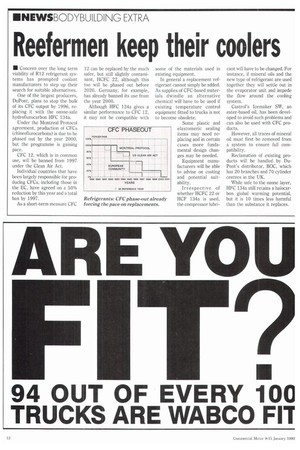Reefermen keep their coolers II Concern over the long term
Page 14

If you've noticed an error in this article please click here to report it so we can fix it.
viability of R12 refrigerant systems has prompted coolant manufacturers to step up their search for suitable alternatives.
One of the largest producers, DuPont, plans to stop the bulk of its CFC output by 1996, replacing it with the ozone-safe hydroflurocarbon HFC 134a.
Under the Montreal Protocol agreement, production of CFCs (chloroflurocarbons) is due to be phased out by the year 2000, but the programme is gaining pace.
CFC 12, which is in common use, will be banned from 1997 under the Clean Air Act.
Individual countries that have been largely responsible for producing CFCs, including those in the EC, have agreed on a 50% reduction by this year and a total ban by 1997.
As a short-term measure CFC 12 can be replaced by the much safer, but still slightly contaminant, HCFC 22, although this too will be phased out before 2020. Germany, for example, has already banned its use from the year 2000.
Although HFC 134a gives a similar performance to CFC 12, it may not be compatible with some of the materials used in existing equipment.
In general a replacement refrigerant cannot simply be added. As supplies of CFC-based materials dwindle an alternative chemical will have to be used if existing temperature control equipment fitted to trucks is not to become obsolete.
Some plastic and elastomeric sealing items may need replacing and in certain cases more fundamental design changes may be needed.
Equipment manufacturers will be able to advise on costing and potential suitability.
Irrespective of whether HCFC 22 or HCF 134a is used, the compressor lubri cant will have to be changed. For instance, if mineral oils and the new type of refrigerant are used together they will settle out in the evaporator unit and impede the flow around the cooling system.
Castrol's Icemaker SW, an ester-based oil, has been developed to avoid such problems and can also be used with CFC products.
However, all traces of mineral oil must first be removed from a system to ensure full compatibility.
Reclamation of existing products will be handled by DuPont's distributor, BOC, which has 20 branches and 70 cylinder centres in the UK.
While safe to the ozone layer, HFC 134a still retains a halocarbon global warming potential, but it is 10 times less harmful than the substance it replaces.
































































